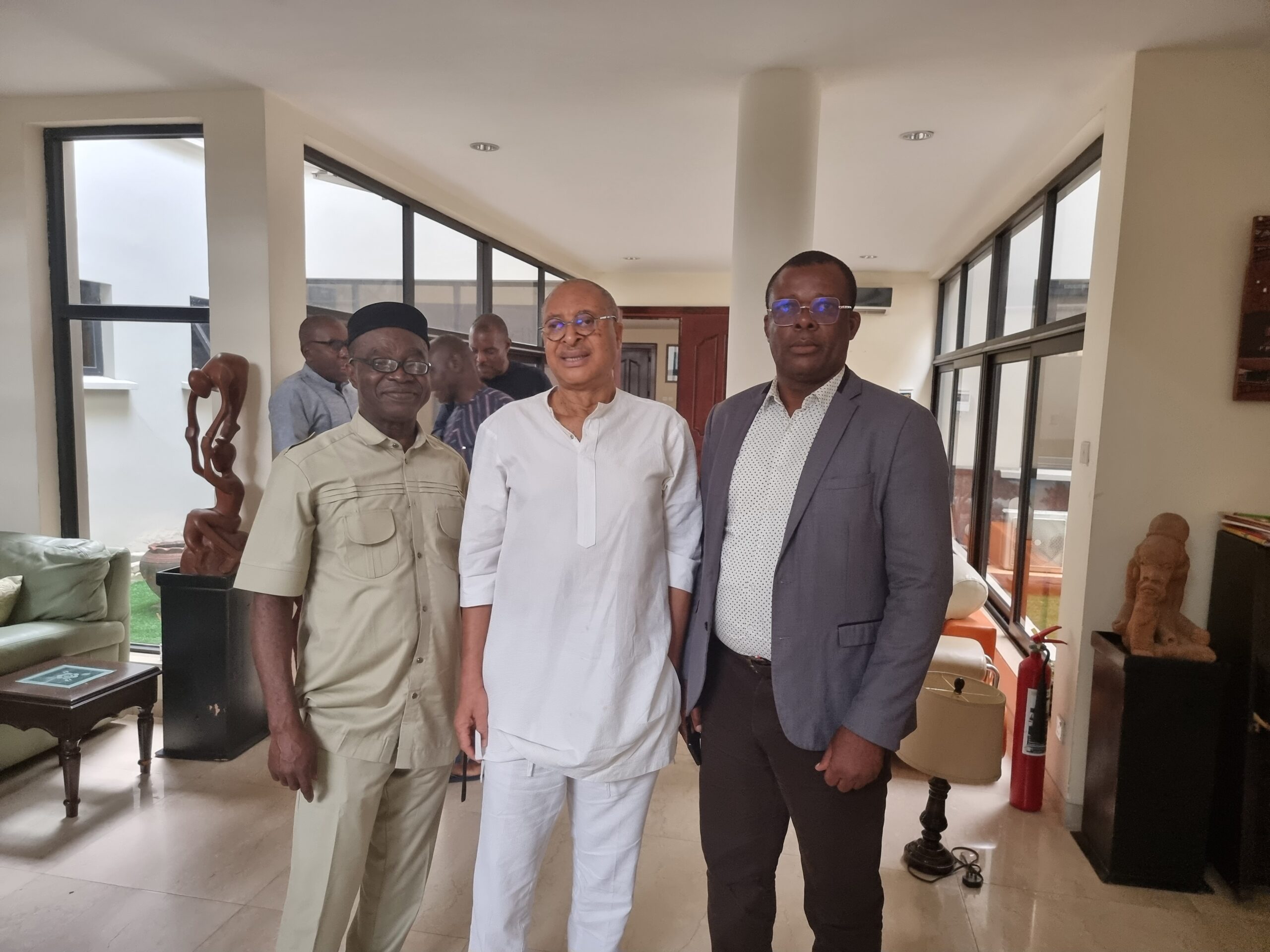Professor of Political Economy Pat Utomi lit up the blogosphere on Friday, 11 August, with tweets disclosing his diagnosis and ongoing treatment for prostate cancer. The tweets received critical attention in the media and drew concerns from several stakeholders. The Jacksonites Alumni Association was a primary stakeholder.
Pat Utomi has one central message. Tell all men above 40 years to commence a habit of regular prostate tests. Early detection is critical to avoid the ravages of deformed prostate, including prostate cancer.
Jeremiah Agada forwarded the tweets to Susan Eshett and me to alert us and to inquire if we knew. Neither of us knew. Nor did many people close to the professor.
READ ALSO: Nigerian Men Need More Awareness Of Prostate Cancer – Utomi
Mobilisation followed. I contacted members of the Jacksonites directly and on the group and class platforms. On Saturday, we would visit the gentleman in solidarity and learn of his challenge first-hand.
Prof Patrick Okedinachi Utomi, Class of 1977, has led The Jacksonites Alumni Association since its inception as a social media-enabled (WhatsApp) engagement and networking outreach. He brought it down to earth by hosting the first physical reunion at his home. As General Secretary, I mobilised members for the visit.
The Jacksonites are alumni of the mass communication department of the University of Nigeria. UNN founder Dr Nnamdi Azikiwe named the first departmental building after his journalism heroes, the father and son team of John Payne and Horatio Jackson, who ran the Lagos Weekly Record in the 1930s.
We met Prof Utomi in better health than we feared. Apart from losing weight, he appeared in good form and in high spirits. Significantly, he was more concerned with others.
READ ALSO: Utomi Opens Up On Battle With Prostate Cancer
Utomi’s tweets on Friday aimed to attract attention and set an agenda of sensitisation of Nigerian males 50-and-above against the dangers of malfunctioning prostate glands. His battle with a diagnosis of prostate cancer accounted for his absence in his accustomed role as a public intellectual and concerned citizen since after the 2023 election.
Utomi tweeted: “When a biopsy showed I was positive last year, I began treatment with a cancer Centre with a branch in Ikeja and VI. I sometimes came from election campaigns to the Ikeja Centre near the Airport. The Doctors would try to smuggle me out from the back.”
“I am moved this dawn of light to confront an epidemic under the carpet with great harm to men. Prostate cancer is bringing death and misery to many men. Had they been forewarned, the misery containment and even chances of cure could be much enhanced, as women have with breast cancer.”
Once the election ended, his family members in Nigeria and abroad pressured Utomi to extend his treatment to specialists in the United States. They collaborated with his better half, a professor of dentistry and a specialist centre in Lakeshore, USA. Part of the regimen included reduced access to his phones and media. Rest and treatment were the observances.
“That’s how come it seemed I went quiet ’cause they controlled my phones to reduce stress,” Utomi disclosed.
Utomi is a crucial figure in the Labour Party. He was a central strategist in ensuring that the Labour Party came from nowhere to become a critical Third Force in Nigerian politics and a voice for the youth and unrepresented demographics.
Jacksonites present during the visit were Ugo Onuoha (85), a former MD of Champion Newspapers Limited, Susan Eshett (86), erstwhile NTA and communications executive at Exxon-Mobil, Emma Esinnah, Country Director of fitness firm Curves International, and Ejike Ekwegbalu, MD/CEO of Midworld Resources Limited and former senior executive at Intercontinental Bank. Others were Mr Vivian Ikem, Corporate Affairs and Communications Director at Habanera Limited, Dr Marcel Mbamalu, publisher of Prime Business Africa, Mr Ikem Okuhu, public relations strategist and author, Mr Jeremiah Agada, Deputy Editor at Brand Communicator and Manager at Awesome Communication and Victor Ezaja of Prime Business Africa.
Men and their Prostate
Utomi stayed under the radar following the counsel of family members. He could not contain himself further following two incidents. During a call, a former airline managing director disclosed his ongoing treatment for prostate problems. Out of church recently, a former vice-chancellor also recounted the same challenge.
His doctors said the Urology Units of many hospitals were now centres of attraction and interest for many men with plumbing concerns or problems.
Experts caution men to regularly do the Prostate Specific Antigen (PSA) test in hospitals or laboratories. They should be more concerned if they have any of these symptoms:
• Difficulty starting urination.
• Weak or interrupted flow of urine.
• Urinating often, especially at night.
• Trouble emptying the bladder completely.
• Pain or burning during urination.
• Blood in the urine or semen.
WebMD.com reports that the prostate is a small gland part of the male reproductive system. It is about the shape and size of a walnut.
“It rests below your bladder and in front of your rectum. It surrounds part of the urethra, the tube in your penis that carries pee from your bladder. The prostate helps make some of the fluid in semen, which carries sperm from your testicles when you ejaculate.
This Gland Can Grow
“As you age, your prostate can become larger. It’s a normal part of ageing for most men.
By the time you reach age 40, your prostate might have gone from the size of a walnut to the size of an apricot. By the time you reach 60, it might be the size of a lemon.
Because it surrounds part of the urethra, the enlarged prostate can squeeze that tube. This causes problems when you try to pee. Typically, you won’t see these problems until you’re 50 or older, but they can start earlier.
You might hear a doctor or nurse call this condition benign prostatic hyperplasia, or BPH for short. It is not cancerous.
Who Might Get an Enlarged Prostate?
BPH is common and cannot be prevented. Age and a family history of BPH are two things that increase the chances you might get it. A few stats on that:
• Some eight out of every ten men eventually develop an enlarged prostate.
• About 90% of men over the age of 85 will have BPH.
• About 30% of men will find their symptoms bothersome.
Treatments
How your doctor handles your condition depends on the details of your case — your age, how much trouble it’s causing, and more. Treatments may include:
Watchful waiting. If you have an enlarged prostate but are not bothered by symptoms, you may be advised to get an annual check-up, which might include a variety of tests.
Lifestyle changes. This includes cutting back on how much you drink at night and before bedtime, especially drinks with alcohol or caffeine.
Medicine
Common treatments for BPH are alpha-blockers, which ease BPH symptoms, and what’s called 5-alpha reductase inhibitors, or 5-ARIs, which help shrink the prostate. Many men may take them together.
Surgery
Men with severe symptoms whom other treatments haven’t helped might have to undergo surgery. Talk to your doctor about possible risks and outcomes.”
Dear Nigerian men above 50: what is the health of your prostate? Check this week and regularly. That is Prof Pat Utomi’s message and concern.

















Follow Us